The pith of Arab mentality in relationships is profoundly entwined with the rich embroidery of social qualities and customs that have been passed down through the ages.
It fills in as the directing power behind the elements of relational associations within the Middle Easterner people group, underscoring the significance of familial bonds, honor, and regard.
Inside the structure of Bedouin connections, this mindset goes about as a compass, coordinating people towards ways of solidarity, fortitude, and common help.
It highlights the meaning of aggregate government assistance over individual longings, supporting a feeling of having a place and interconnectedness among relatives and then some.
At its center, the Arab mentality in relationships is a demonstration of the perseverance through tradition of social legacy, where values, for example, honor and regard, act as mainstays of solidarity.
These qualities shape not just the manner in which people cooperate with each other but additionally how clashes are tended to and goals are looked for, underscoring compromise and agreement.
In addition, the exploration of Arab mentality in relationships reveals a rich tapestry of tradition, familial bonds, and cultural intricacies. Throughout this investigation, it has become evident that the Arab mentality in relationships is deeply entrenched in age-old customs and values, where respect for elders, loyalty to family, and the preservation of honor and reputation are paramount.
From the courtship process to the dynamics within marriages, the influence of Arab mentality in relationships is profound, shaping the way individuals navigate love, commitment, and partnership. 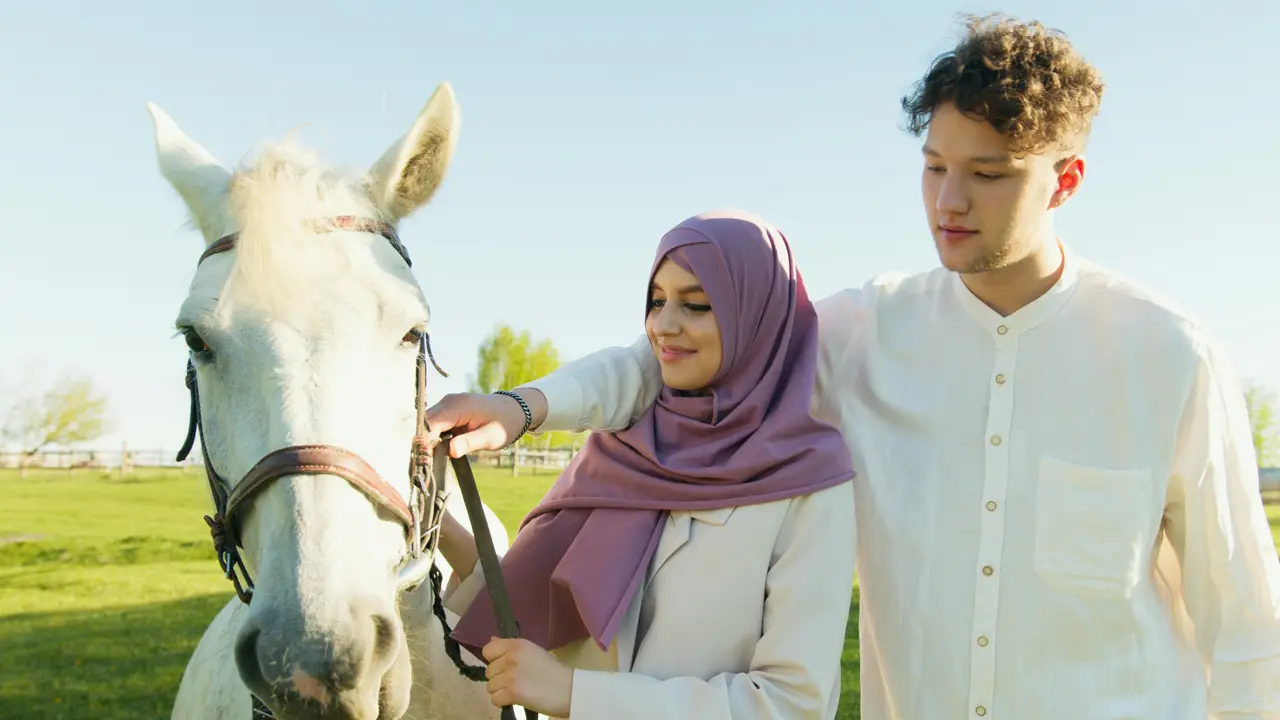
Family plays a central role in Arab relationships, with decisions often made collectively and marriages viewed as unions not only between individuals but between families.
This collective approach underscores the importance of familial harmony and cohesion in Arab society. Moreover, the impact of religion cannot be overstated, as Islamic teachings guide behavior within relationships, emphasizing the sanctity of marriage and prescribing roles for men and women.
Challenges inevitably arise as individuals seek to reconcile traditional values with modern ideals. The tension between personal desires and familial expectations can create friction, particularly concerning issues like freedom of choice in partners and evolving gender roles.
However, despite these challenges, Arab couples often navigate these complexities with resilience and a commitment to preserving cultural heritage while adapting to changing societal norms.
As we delve deeper into the complexities of Arab mentality in relationships, it becomes apparent that variations exist across different countries and regions.
While overarching themes persist, nuances emerge due to regional customs, socioeconomic factors, and levels of modernization. Yet, regardless of these variations, the fundamental values of respect, loyalty, and honor remain steadfast pillars of Arab relationships.
In multicultural settings, Arab couples encounter additional layers of complexity as they navigate cultural disparities. Effective communication, mutual respect, and a willingness to bridge cultural gaps are essential for fostering understanding and harmony in such relationships.
In essence, the study of Arab mentality in relationships offers profound insights into the intricate interplay between tradition, culture, and love.
It underscores the resilience of cultural values in shaping the dynamics of relationships while also highlighting the adaptability of individuals in navigating the evolving landscape of modernity.
By embracing the complexities of Arab mentality in relationships, we gain a deeper appreciation for the richness and diversity of human connections in all their forms.
impacts the actual texture of adoration and marriage, directing the jobs, assumptions, and customs that oversee heartfelt associations.
Whether through organized relationships saturated with custom or love relationships in light of individual decisions, social standards assume an essential part in forming the direction of connections.
As Bedouin social orders develop notwithstanding advancement, the test lies in exploring the fragile harmony between saving practice and embracing progress.
It is through a comprehension and enthusiasm for the arab mentality in relationships that people can manufacture significant associations established in sympathy, regard, and social getting arab mentality in relationships
I. Understanding the Arab Mentality in Relationships
Cultural Background
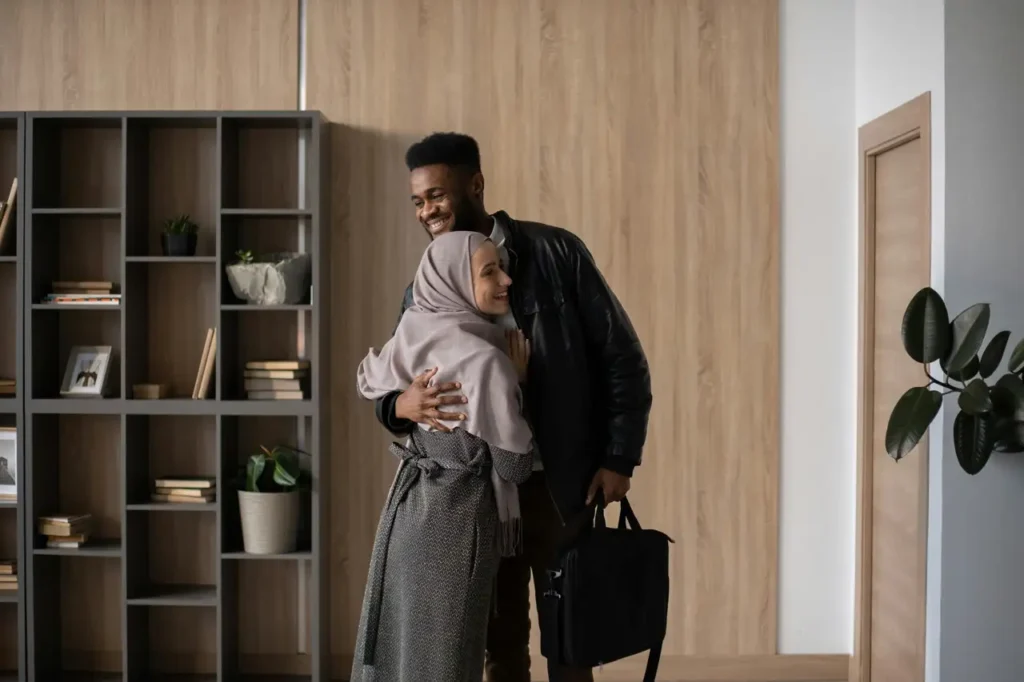
Bedouin culture remains a stronghold of history and custom, where the structure holding the system together is complicatedly woven with familial bonds, repeating the embodiment of the arab mentality in relationships Through the chronicles of time
regard for older folks has filled in as a core value.
mooring people to their foundations and encouraging intergenerational associations. Adherence to customs goes about as a key part, stringing together the unpredictable embroidery of social practices that characterize Middle Easterner personality. Inside this social structure, protecting honor rules epitomizes the guiding principles that support the Bedouin mindset in connections.
In the mosaic of Bedouin society, familial bonds arise as the foundation whereupon connections are fabricated, encapsulating the actual embodiment of the arab mentality in relationships These bonds act as the bedrock of social union, sustaining a feeling of connection that rises above familial ties.
Inside this familial design, regard for elderly folks expects fundamental significance, repeating the love for custom and insight that describe Middle Easterner connections.
Moreover, adherence to customs and customs goes about as a binding together power, molding the elements of relational associations as per the directs of the arab mentality in relationships Whether through mutual social occasions, strict functions, or social festivals, these traditions act as standards that support shared values and aggregate character.
In maintaining these traditions, people honor the rich embroidery of the Bedouin legacy, cultivating a feeling of congruity and having a place that saturates each part of public activity.
Besides, the safeguarding of honor arises as a core value, directing people in their connections and molding how clashes are tended to inside the setting of Bedouin connections.
Maintaining honor involves regard for oneself as well as protecting the poise and notoriety of one’s family and local area. It is from the perspective of high standing that the Arab mentality in relationships shows, permeating each cooperation with a feeling of nobility, uprightness, and shared regard.
Importance of Relationships
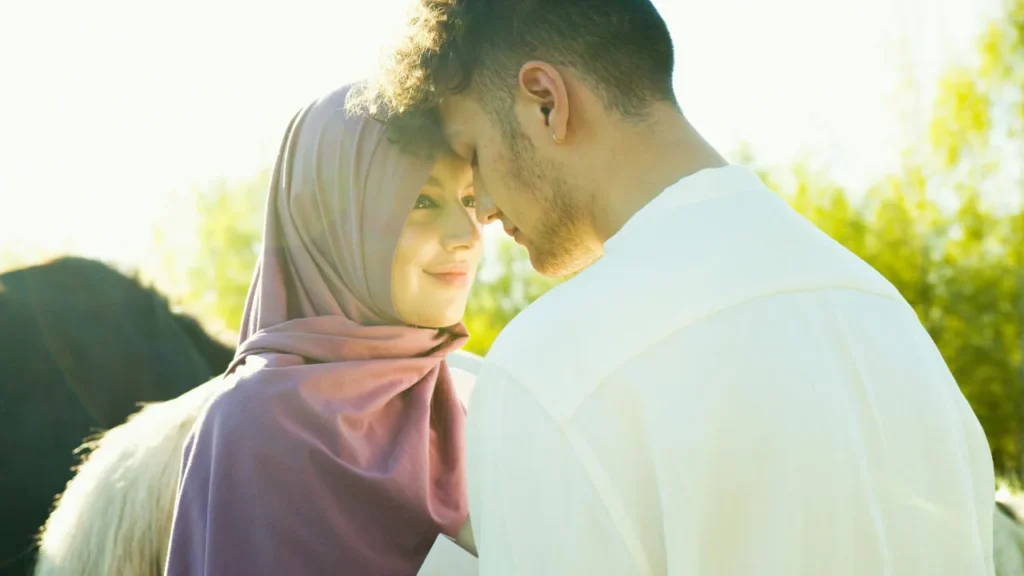
In Bedouin social orders, the ethos of the arab mentality in relationships pervades each aspect of social
collaboration, rising above the limits of close family ties to embrace the more extensive local area texture.
Inside this interconnected snare of connections, the Middle Easterner mindset fills in as a directing guide, enlightening the way towards significant associations and persevering through bonds.
The Arab mentality in relationships highlights the characteristic worth put on major areas of strength for cultivating associations that reach out past the limits of family unit units.
It is inside this broad organization of expanded family members and local area ties that people discover a feeling of having a place and connection, enhancing their lives with shared encounters and aggregate help.
In addition, the development and conservation of these connections are profoundly imbued in the social texture of Middle Eastern social orders, mirroring the central fundamentals of the Arab mentality in relationships.
Whether through familial get-togethers, local area occasions, or strict functions, people effectively support and keep up with these associations, perceiving their characteristic worth in encouraging social attachment and fortitude.
Moreover, the Arab mentality in relationships focuses on the development of sympathy, empathy, and common regard, encouraging a climate where people feel esteemed and figured out inside their groups of friends.
Through these relational associations, bonds are manufactured, rising above simple acquaintanceship to cultivate profound, significant connections that endure everyday hardship.
By embracing this ethos, people can explore the complex scene of relational associations with elegance, sympathy, and a firmly established worship for the rich embroidery of Middle Eastern social legacy.
II. Characteristics of Arab Relationships
Gender Roles
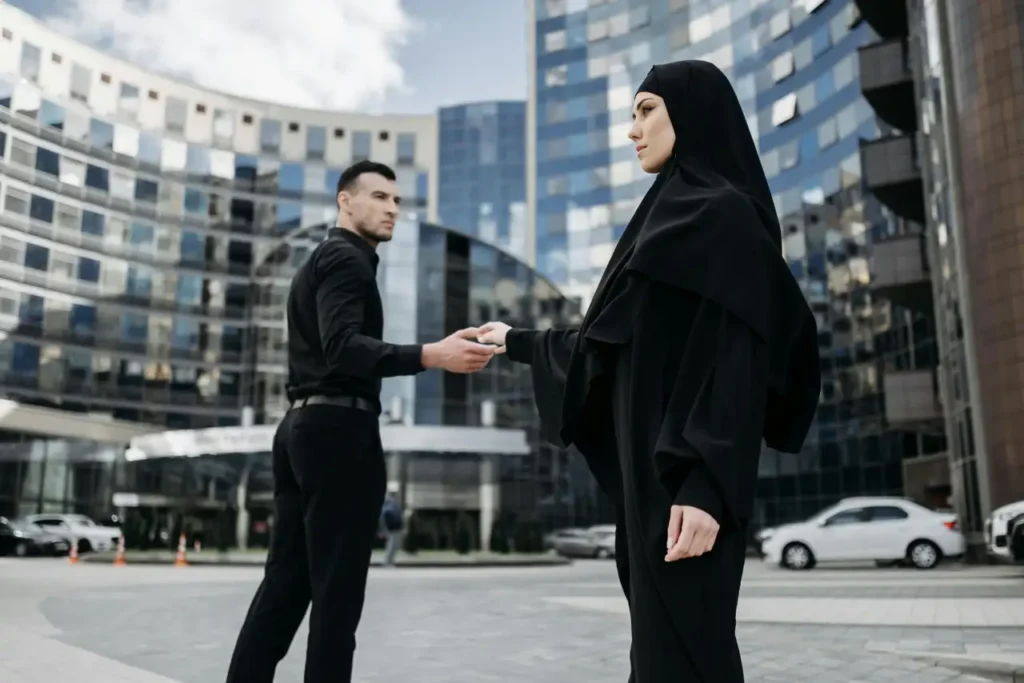
In Bedouin social orders, the Arab mentality in relationships is complicatedly entwined with conventional orientation jobs, which have long assumed a huge part in molding social elements and relational communications.
These orientation jobs outline particular assumptions for people inside the family and society, reflecting profoundly instilled social standards and values.
Inside the structure of Middle Easterner connections, conventional orientation jobs act as a core value that impacts conduct, mentalities, and assumptions.
Men are frequently expected to accept the job of supplier and defender, while ladies are commonly entrusted with supporting and providing care liabilities. These jobs are not just prescriptive; they are pervaded with social importance, reflecting more extensive cultural assumptions and standards.
Regardless of the development of cultural standards and the rising cooperation of ladies in different circles of life, conventional orientation jobs keep on applying impact over relationship elements within the Bedouin people group.
While there might be more noteworthy adaptability and variation in contemporary settings, the basic standards of these jobs persist, molding the manner in which people see themselves and each other inside the setting of connections.
Besides, the arab mentality in relationships envelops a consciousness of and adherence to these customary orientation jobs, though with an acknowledgment of their developing nature.
While there might be space for discussion and redefinition, the central standards of orientation jobs remain profoundly imbued in the shared awareness of Bedouin society.
Moreover, the effect of customary orientation jobs stretches beyond individual connections to encompass more extensive cultural designs and elements.
The propagation of these jobs adds to the support of social requests and security, building up ideas of familial obligation, honor, and regard.
Fundamentally, the Middle Easterner mindset in connections mirrors a perplexing transaction among custom and innovation, where conventional orientation jobs keep on applying impact while at the same time adjusting to changing cultural standards and values.
By getting it and exploring the subtleties of these jobs with awareness and sympathy, people can fashion connections that are both established in custom and receptive to the requests of contemporary life within the Bedouin people group.
Honor and Respect
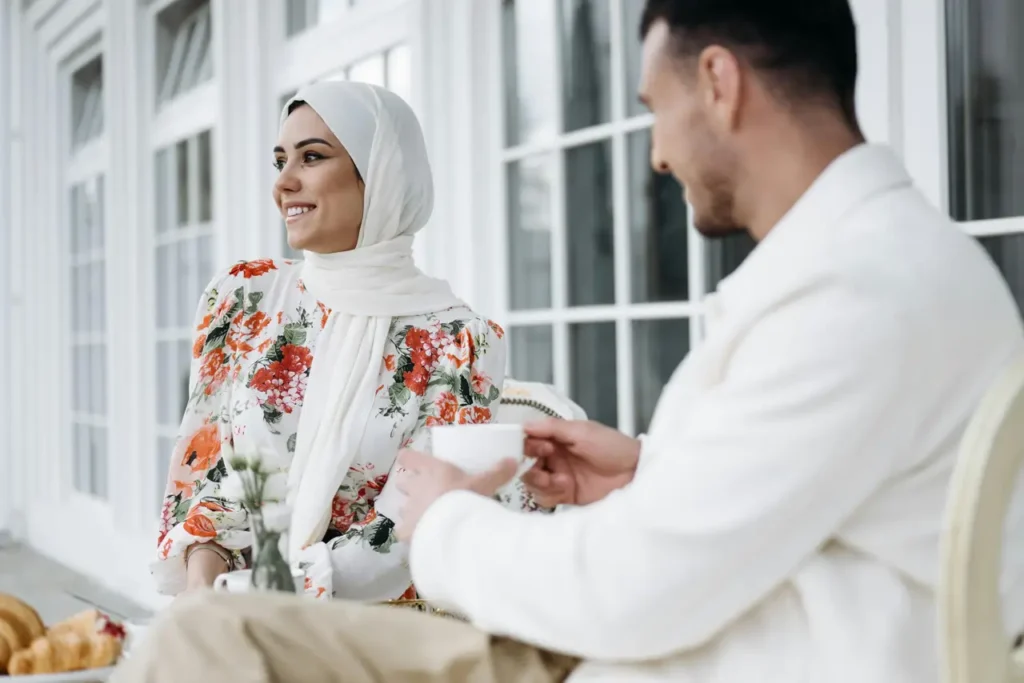
In Arab societies, honor stands as the cornerstone of the Arab mentality in relationships, permeating every aspect of social interaction and guiding behavior and decision-making with unwavering conviction.
Within this cultural framework, the concept of honor transcends individual actions to encompass a profound reverence for one’s family, community, and cultural heritage.
At the heart of Arab relationships lies a deep-seated commitment to upholding honor, reflecting the essence of the Arab mentality in relationships.This commitment manifests in myriad ways, from the way individuals conduct themselves in social settings to the manner in which they navigate conflicts and challenges within interpersonal dynamics.
Bedouin people Respect for one’s family, community, and cultural heritage serves as the bedrock upon which the concept of honor is built, underscoring the interconnected of individual identity with collective identity. It is through the lens of honor that individuals navigate the complexities of social interactions, prioritizing the preservation of dignity, integrity, and reputation above all else.
Moreover, the Arab mentality in relationships fosters a culture of mutual respect and reciprocity, where every interaction is imbued with a deep sense of reverence for the inherent worth and dignity of others.
This culture of respect extends beyond familial ties to encompass relationships within the broader community, reflecting the interconnected nature of Arab society.
Furthermore, the concept of honor serves as a guiding principle in decision-making within Arab relationships, shaping choices and actions in alignment with values of integrity, righteousness, and moral fortitude.
Whether in matters of marriage, career, or personal conduct, individuals are guided by a deep-seated commitment to upholding honor and preserving the sanctity of familial and social bonds.
In essence, honor plays a central role in Arab relationships, serving as a guiding light that illuminates the path towards harmonious interpersonal connections and collective well-being. By embracing the principles of honor and respect, individuals can cultivate relationships rooted in dignity, integrity, and mutual esteem, fostering a culture of solidarity and cohesion within Arab communities.
III. Communication Patterns
Indirect Communication
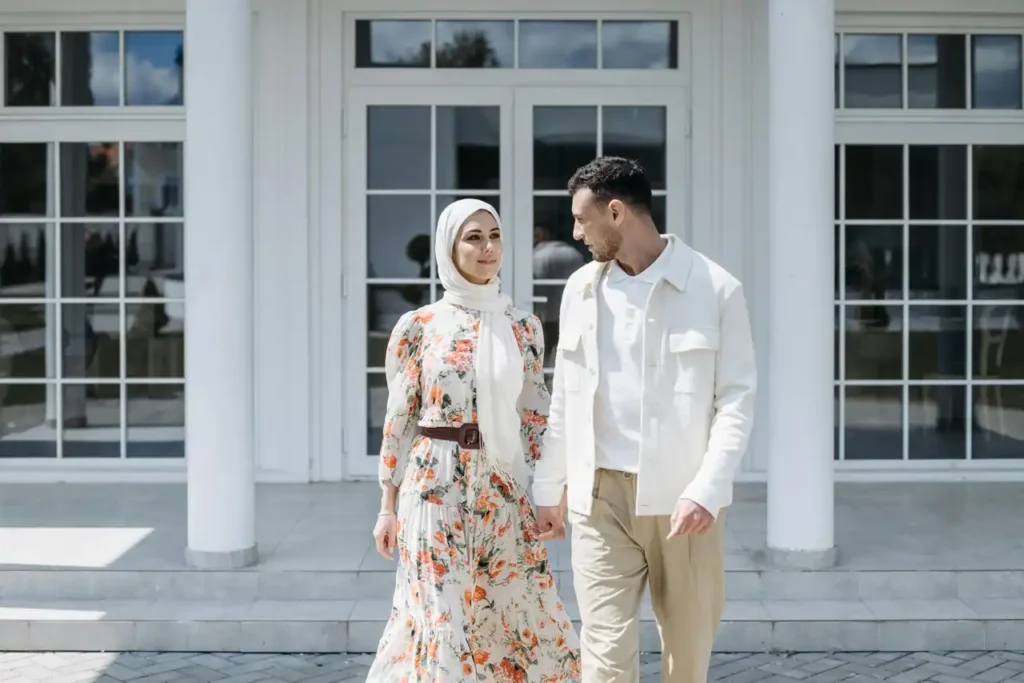
The Arab mentality in relationships is complicatedly connected to correspondence styles, where the inclination for backhanded correspondence fills in as a main quality of relational collaborations inside Middle Eastern social orders.
This nuanced way to deal with correspondence mirrors a profoundly instilled desire to protect congruity and keep away from struggle, highlighting the significance of keeping up with positive connections and encouraging common comprehension.
Inside the setting of Bedouin connections, circuitous correspondence arises as a social standard that shapes the manner in which people articulate their thoughts and decipher the messages passed on by others.
As opposed to depending entirely on unequivocal verbal prompts, Middle Easterners frequently utilize nuances and subtleties in their correspondence, drawing upon signals, manner of speaking, and non-verbal signals to convey meaning.
This dependence on roundabout correspondence can be attributed to the Middle Eastern mindset in connections, which focuses on the support of amicability and the aversion of conflict.
By exploring discussions with class and responsiveness, people plan to protect the fragile equilibrium of social elements and maintain the nobility and regard of all gatherings included.
Moreover, the inclination for aberrant correspondence highlights the significance of compassion and the capacity to understand anyone on a profound level within Middle Eastern connections.
By adjusting oneself to the nuances of correspondence, people can all the more likely comprehend the basic opinions and expectations behind the words expressed, cultivating further associations and common trust.
Significance of Non-Verbal Communication
In Bedouin connections, the Middle Easterner mindset is profoundly entwined with the meaning of non-verbal correspondence, which fills in as a foundation of relational communications.
This nuanced type of correspondence incorporates a great many motions, looks, and non-verbal communication, each loaded down with significant social importance.
Inside the setting of Bedouin social orders, non-verbal correspondence assumes a critical role in conveying feelings and expectations. Whether through an unpretentious gesture of understanding, a comforting grin, or a slight slant of the head, these non-verbal signals act as strong marks of one’s inward considerations and sentiments.
Focusing on these prompts is vital for figuring out the complexities of Middle Eastern connections. By adjusting oneself to the subtleties of non-verbal correspondence, people can interpret the hidden opinions behind the words expressed, acquiring knowledge of the implicit feelings that shape relational associations.
IV. Problem Solving
Prevent an Eastern Confrontation
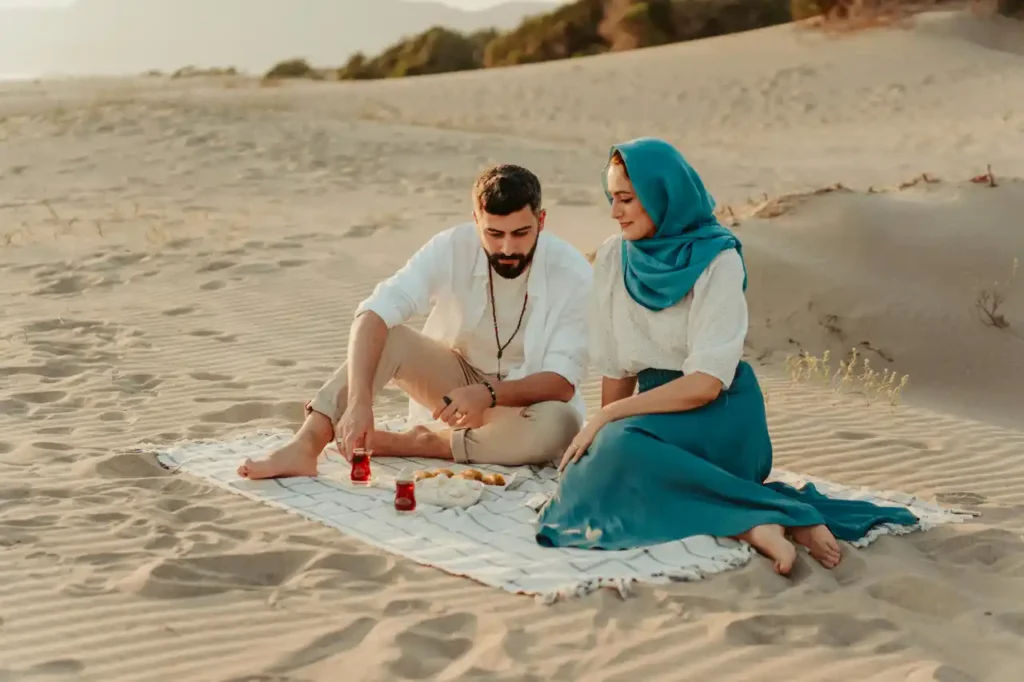
In Middle Eastern connections, individuals frequently keep away from direct contentions or battles. All things considered, they attempt to keep things quiet and conscious.
This is on the grounds that they care about not humiliating themselves or others. In this way, on the off chance that there’s an issue, they could discuss it in private or ask another person to assist them with figuring it out. Along these lines, they can tackle issues without creating a major situation or making anybody feel horrible.
This approach is essential for the Bedouin attitude in connections, where keeping concordance is critical to hiding a sense of failure. They put stock in taking care of struggles unobtrusively and with nobility as opposed to raising a huge ruckus. Along these lines, they can keep up with great connections and stay away from pointless pressure or eking Mediation.
In Bedouin connections, when there’s a conflict or issue, individuals frequently go to more seasoned or regarded individuals from the local area for help. These could be seniors or pioneers who are trusted to tune in and offer guidance.
This is on the grounds that they have faith in settling clashes in a way that safeguards all interested parties and keeps areas of strength for connections. Looking for help from these figures is essential for the arab mentality in relationships
where keeping up with respect and agreement is significant. They believe that these arbiters can assist with tracking down fair arrangements while additionally safeguarding everybody’s honor.
By including regarded elderly folks or pioneers, they can deal with clashes with astuteness and care, staying away from additional pressure or being in a miserable mood. This approach shows the values and need to keep areas of strength.
V. Love and Marriage
Arranged Marriages vs. Love Marriages
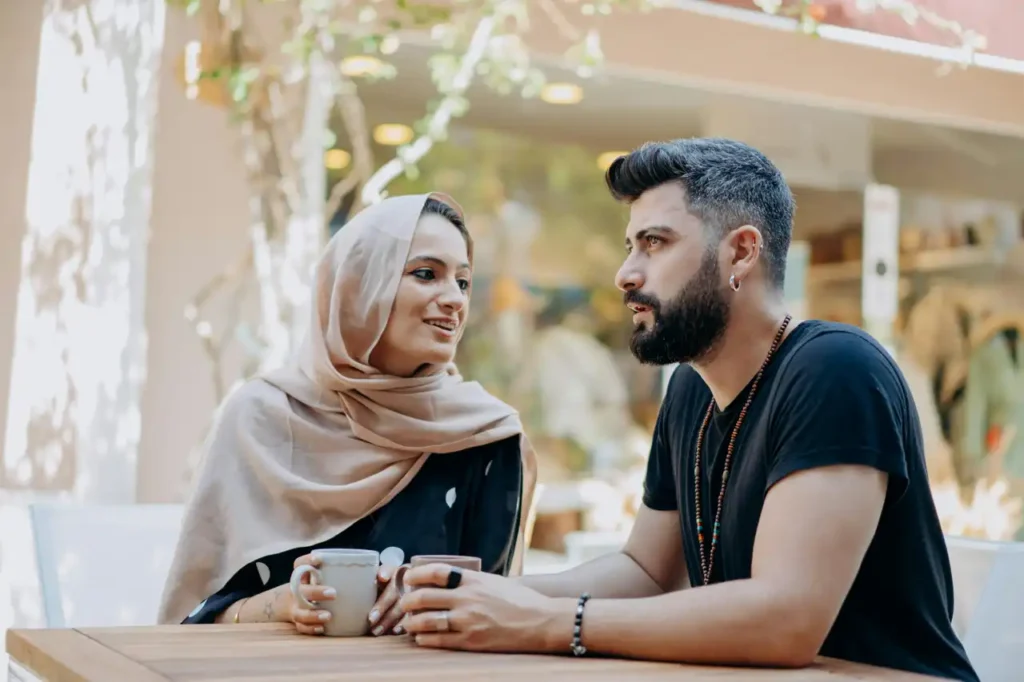
In Middle Eastern social orders, relationships come in various forms, including organized relationships and love relationships. The two sorts are molded by social customs, family expectations, and what people need.
This shows the arab mentality in relationships where family and culture assumrolemajor part. In organized relationships, families assist with picking accomplices incustom, of custom and their thought process is best for all interested partiesaffectionaten affection relationships.
people pick their accomplices in view of their own sentim;nhowever,wants, however they actually think about family and culture. This concurrence of organized and love relationships mirrors the intricacy of Middle Easterner connections, where custom and individual decision cross.
It shows that in Bedouin society, there’s space for various approaches to tracking down affection and building families, each impacted by the qualities aofassumptions for the local area. This variety features the versatility and strength of Middle Easterner connections, where social standards and individual inclinations interweave to shape the way to marriage and bliss.
Traditional Influence on Choosing a Partner
In Arab societies, tradition holds a powerful sway over the process of selecting a partner for marriage. This aspect of the Arab mentality in relationships emphasizes the importance of adhering to cultural norms and upholding family values.
When it comes to choosing a life partner, factors such as family background, social status, and religious compatibility carry substantial weight in the decision-making process.
Traditionally, families play a central role in partner selection, often acting as mediators in the search for a suitable match. They consider various aspects of compatibility, including shared values, upbringing, and cultural practices, to ensure a harmonious union that aligns with societal expectations.
Moreover, social status is a significant consideration in partner selection, reflecting the desire to maintain family honor and prestige within the community. Families may seek matches that uphold or enhance their social standing, ensuring compatibility not only on a personal level but also within the broader social context.
Religious compatibility is also paramount in Arab relationships, as the preservation of religious values and traditions is integral to maintaining cultural identity and continuity. Partners are often chosen based on their adherence to religious principles and their commitment to upholding shared beliefs and practices.
Overall, tradition plays a pivotal role in partner selection within Arab societies, shaping the criteria by which individuals and families evaluate potential matches. By adhering to cultural norms and honoring familial expectations, Arabs uphold the values of tradition and continuity while forging meaningful relationships grounded in shared heritage and mutual respect.
VI. Challenges and Adaptations
Honoring Heritage
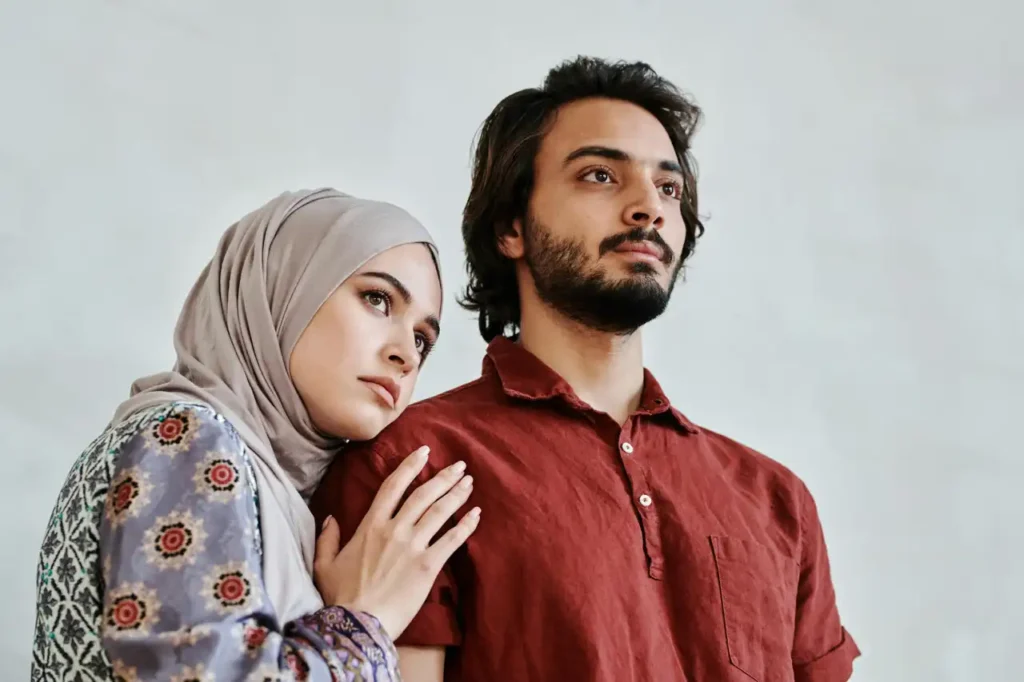
As Bedouin social orders experience quick modernization, people wind up at a junction, exploring the sensitive harmony between conventional qualities and contemporary ways of life. This battle is key to the Bedouin mindset in connections, as it shapes the elements of relational associations in the midst of advancing cultural standards.
The pressure between custom and innovation presents remarkable difficulties to relationship elements within the Middle Easterner people group.
While customary qualities underline ideas, for example, family honor, regard, and collective concordance, contemporary ways of life frequently advocate for individual independence, individual flexibility, and uniformity inside connections.
In this mind-boggling scene, people wrestle with accommodating the assumptions for their families and networks with their own longings and goals.
This struggle under the surface is reflected in their decisions in regards to accomplice determination, marriage elements, and orientation jobs within connections.
Harmonizing Heritage with Innovation
In the contemporary world, finding a balance between respecting social customs and embracing cultural changes is a continuous undertaking for Bedouin people and couples exploring connections.
This sensitive dance mirrors the quintessence of the Middle Eastern attitude toward connections, where the protection of legacy and the variation of developing standards combine to chase after agreeable associations.
Bedouin people and couples wrestle with the complexities of keeping up with social personalities while exploring the intricacies of current life. The Bedouin attitude in connections highlights the significance of regarding custom while additionally embracing the open doors introduced by cultural changes.
At the core of this difficult exercise lies a significant veneration for social legacy, entwined with a readiness to develop and adjust to the requests of the cutting-edge world. Middle Easterners and couples endeavor to maintain the qualities imparted by custom while exploring the moving elements of contemporary connections.
This cycle requires a fragile route of social standards and cultural assumptions, as well as a guarantee of open correspondence and shared understanding. The Bedouin attitude toward connections stresses the significance of cultivating sympathy, regard, and versatility despite challenges.
Eventually, the Middle Easterner mindset in connections is a demonstration of the strength and versatility of Bedouin people and couples. It is an impression of their obligation to protect social legacy while embracing the open doors for development and change introduced by the cutting-edge world.
Dating or being involved with a Middle Eastern man who comes from an alternate social foundation can bring advantages and difficulties. Understanding the Middle Eastern attitude toward connections is fundamental to actually exploring these elements.
Advantages and Disadvantages of Relationships with an Arab Man
Advantages:

Social Enhancement: Being involved with a Middle Easterner man offers a potential chance to immerse yourself in Bedouin culture, customs, and values, creating an extraordinary social encounter.
Family Direction: Middle Eastern men frequently focus on family and local areas, cultivating solid familial bonds and a feeling of having a place inside connections.
Regard and Valor: The Middle Easterner mindset in connections accentuates regard, honor, and gallantry, with Bedouin men frequently showing customary upsides of civility and respectfulness towards their accomplices.
Social Variety: Associations with Middle Eastern men can acquaint you with different viewpoints, customs, and dialects, advancing your comprehension of how you might interpret the world and cultivating social trade.
Shared Values: Notwithstanding social contrasts, associations with Middle Eastern men might be grounded in shared values like devotion, responsibility, and common regard, adding to serious areas of strength for the organization.
Disadvantages:
Social Contrasts: Social variations between accomplices might prompt misconceptions, clashes, or difficulties in correspondence, requiring persistence and understanding to survive.
Family Assumptions: The Middle Eastern mindset in connections frequently includes the huge contribution of families in direction, which can cause strain or clashes in the event that family assumptions vary from individual inclinations.
Orientation Jobs: Customary orientation jobs might impact relationship elements, with assumptions put on the two accomplices to stick to social standards, possibly causing strain or unevenness in the relationship.
Strict Contrasts: Contrasts in strict convictions or practices might present difficulties, especially in the event that accomplices have differentiating views on otherworldliness or strict recognition.
Social Shame: Associations with Middle Eastern men might confront social disgrace or investigation from both inside and outside the local area, requiring versatility and backing from accomplices to explore cultural decisions.
VII. Conclusion
the exploration of Arab mentality in relationships unveils a rich tapestry of tradition, familial bonds, and cultural intricacies. Throughout this investigation, it becomes evident that the Arab mentality in relationships is deeply entrenched in age-old customs and values, where respect for elders, loyalty to family, and the preservation of honor and reputation are paramount.
From the courtship process to the dynamics within marriages, the influence of Arab mentality in relationships is profound, shaping the way individuals navigate love, commitment, and partnership.
Family plays a central role in Arab relationships, with decisions often made collectively and marriages viewed as unions not only between individuals but between families.
This collective approach underscores the importance of familial harmony and cohesion in Arab society. Moreover, the impact of religion cannot be overstated, as Islamic teachings guide behavior within relationships, emphasizing the sanctity of marriage and prescribing roles for men and women.
Challenges inevitably arise as individuals seek to reconcile traditional values with modern ideals. The tension between personal desires and familial expectations can create friction, particularly concerning issues like freedom of choice in partners and evolving gender roles.
However, despite these challenges, Arab couples often navigate these complexities with resilience and a commitment to preserving cultural heritage while adapting to changing societal norms.
As we delve deeper into the complexities of Arab mentality in relationships, it becomes apparent that variations exist across different countries and regions.
While overarching themes persist, nuances emerge due to regional customs, socioeconomic factors, and levels of modernization. Yet, regardless of these variations, the fundamental values of respect, loyalty, and honor remain steadfast pillars of Arab relationships.
In multicultural settings, Arab couples encounter additional layers of complexity as they navigate cultural disparities. Effective communication, mutual respect, and a willingness to bridge cultural gaps are essential for fostering understanding and harmony in such relationships.
In essence, the study of Arab mentality in relationships offers profound insights into the intricate interplay between tradition, culture, and love.
It underscores the resilience of cultural values in shaping the dynamics of relationships while highlighting the adaptability of individuals in navigating the evolving landscape of modernity. By embracing the complexities of Arab mentality in relationships, we gain a deeper appreciation for the richness and diversity of human connections in all their forms.
FAQs
What is the Arab mentality in relationships?
The Arab mentality in relationships refers to the cultural norms, values, and attitudes that shape interpersonal connections within Arab societies.
What characterizes the Arab mentality in relationships?
Arab mentality in relationships is often deeply rooted in tradition, family values, and cultural norms. Respect for elders, loyalty to family, and the importance of honor and reputation are significant aspects.
What role do family dynamics play in Arab relationships?
Family dynamics hold great importance in Arab relationships. Decision-making is often collective, with input from parents and extended family members being considered crucial. Marriages are often seen as a union between families rather than just individuals.
How does religion impact Arab relationships?
Religion, particularly Islam, plays a pivotal role in shaping Arab relationships, influencing concepts like the sanctity of marriage, modesty, and gender roles.
What defines the mentality of Arabs in relationships?
The Arab mentality in relationships is deeply influenced by cultural traditions, emphasizing values like respect for elders, familial loyalty, and the significance of honor and reputation.
